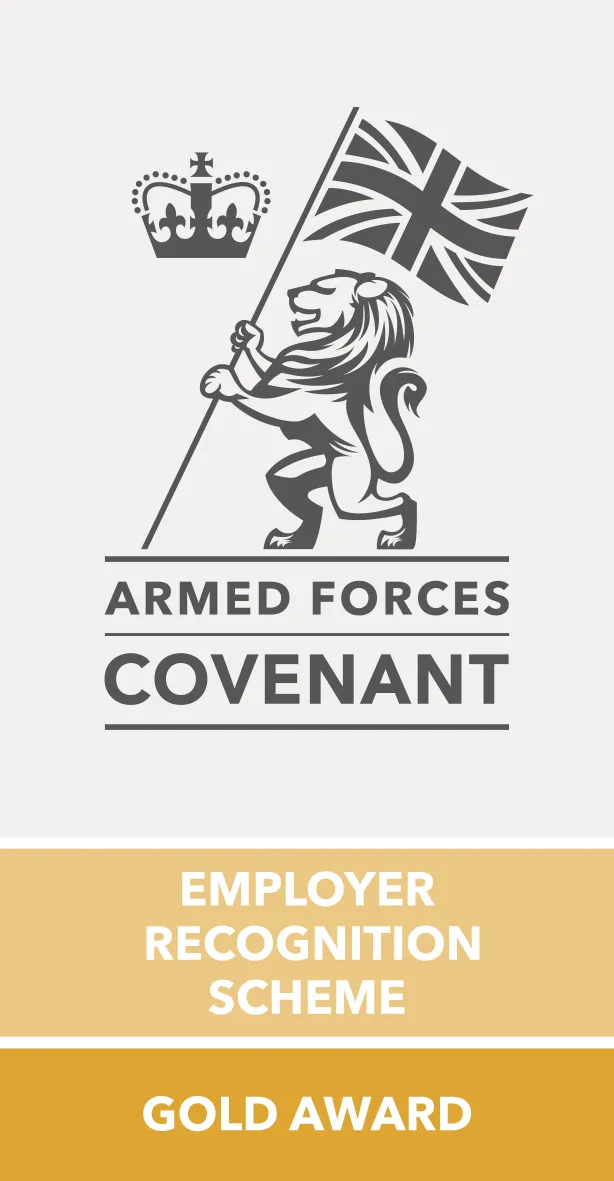
Careers at Exeter
HM Armed Forces veterans, reservists or service family members who meet all of the essential criteria at the application stage will be given additional consideration for an interview.
The University of Exeter works with the Career Transition Partnership to support HM Forces Veterans, and is also able to offer informal mentoring and support for veterans interested in working in Higher Education or the University of Exeter specifically. We are currently working through our professional services support staff Job Descriptions to make them easier to understand, but if you would like to talk a potential job through with one of our AFC Group we would be happy to help, contact us via email at armedforcescovenant@exeter.ac.uk
Choose Exeter for your next career opportunity
At Exeter University, we are dedicated to helping our ex-military personnel in finding a new career outside the Armed Forces.
We understand how the transition from a rewarding career in the military to a new and unfamiliar work setting can be both daunting and challenging, especially if you’re unsure where to channel your newfound skills and experience.
At Exeter University, there is a place for everyone to contribute and make a difference. Whether you are looking to go into an entry-level post, or you’re looking to take your skills and experience into a management and leadership position, we have a high number of vacancies on offer at all levels, across a multitude of areas in both professional services and Academia.
If you are interested in starting a new career outside the Armed Forces at Exeter University, then please see below for further information on how you can kick-start your career search and why Exeter University is an employer of choice for all.
Why Exeter is the employer of choice in the southwest
We are a member of the prestigious Russell Group of research-intensive universities and in the top 150 universities in the world (Times Higher Education World University Rankings 2019). We combine world-class teaching with world-class research, achieving a Gold rating in the Teaching Excellence Framework Award 2017.
Our research income in recent years means we’re the fastest growing UK Research University and we seek to answer some of the most fundamental issues facing humankind today through this. 98% of our research is of international quality (2014 Research Excellence Framework) and we encourage proactive engagement with industry, business and community partners to enhance the impact of research and education and improve the employability of our students.
With over 22,000 students and 5,500 staff from 180 different countries, we offer a diverse and engaging environment in which to work. We are an equal opportunity employer, a Disability Confident employer and an Athena Swan accredited institution.
Benefits
We offer some fantastic benefits including:
- 39/41 days leave per year
- options for flexible working
- numerous discounts at leading retailers
- onsite gyms on all of our campus’ and a cycle to work scheme
- sector-leading policies around maternity, adoption and shared parental leave (up to 26 weeks full pay), paternity leave (up to six weeks full pay) and a new Fertility Treatment Policy
- stunning campus environments in Exeter and Cornwall, in the beautiful South West of England
For further support on how to apply for our vacancies, please click How to apply
How to set up a job alert
You can set up job alerts by registering on our website, selecting the “admin, professional and managerial” job category (untick the “all” option), clicking the search button, and then clicking on the link to save the search as a job alert. Job alerts will automatically send you an email notification when an apprenticeship job is advertised, this will save you time, meaning you won’t need to keep checking the vacancies section.
More opportunities will be added as vacancies arise, so keep your eye on our website for the most up to date information.
Application Tips
It's really important to ensure that your answers are relevant and to the point, as recruiters will have a large number of applications to read and they want to look for how you meet the criteria and grade your answers accordingly.
General
- Follow all the instructions carefully. If a question has a word limit then stick to it. If you disobey instructions, the recruiter may assume you cannot pay attention to detail.
- Read the advert and job description carefully. Highlight everything the recruiter is looking for in the advert and Job description and make sure you include examples of how you meet these in your personal statement. Many candidates are shortlisted based on a point-scoring process where the highest-scoring candidates are taken through to interview so it’s important you address each and every criteria to the best of your ability and that you back up each statement with a relevant example.
- Complete all sections of an application form as they are important and should be filled in accurately – if a section is not applicable to you, write ‘N/A’ (Not applicable) to acknowledge it.
- Draft your answers in Word first so you can check spelling and grammar. Recruiters will be reviewing your writing ability.
- Get someone else to check your application for you; many are rejected due to basic mistakes.
- Take your time. You need to provide information that shows you’ve thought about why you’d be good at the job, why you want it and why you’d like to work there.
- Keep a copy of the completed application form for future reference. If you are invited to an interview you will need to remember what you wrote as the employer will probably use that information as a basis for their questions.
- Don't cut and paste. Employers can often tell if your answers are taken from previous applications, as employers look for different things in the questions they ask. People have even been known to leave a previous employer’s name in their next application!
- Write positively about yourself - if you don’t, then they won’t know about your good points. Using positive language isn’t the same as being arrogant.
Employment and work experience
- Give brief details of each period of employment and work experience including voluntary and unpaid work if you wish.
- Make good use of the ‘responsibilities’ section to get across your achievements, as well as the skills and qualities you developed and demonstrated in each role. Focus on those the recruiter is looking for.
- Don’t leave out what you may perceive to be ‘low-grade’ jobs. For example, shop and restaurant work gives the experience of dealing with the public, working under pressure, handling money, etc.
Personal statement
- Describe what motivates you and attracts you about the job. Show that you have a realistic understanding of what is involved and can draw parallels with positive experiences you have already had, even if these have been in different settings.
- Why this organisation? Say why you want to work for this particular organisation, for example, this might be related to its clients, values, reputation or staff development policy. Draw on the research you have done in preparing to apply and don’t just make it up! Be honest about your reasons (although don’t just say that the salary appeals!).
- Create sections using sub-headings derived from those in the person specification (Essential and desirable criteria). Include all the information asked for. Make the match against the person specification or job description.
- Address each one of the 'person specification' statements individually, giving your answer in a CAR statement (Context, Actions, and Results). When you complete the supporting statement you should give examples of how your qualifications, skills, knowledge, interests and experience match the essential and desirable criteria for the vacancy.
- For example, if the person specification states 'must have the ability to prioritise and manage a busy workload', describe in detail how you have developed this skill and provide evidence from your course, work experience or interests. This is the opportunity for you to demonstrate your relevant skills, attributes and specific knowledge, so make sure you sell yourself.
- If you don’t have an example of how you meet certain criteria explain what you would do to get that experience/skill.
- End with a closing paragraph. Try to end on a high note with a positive concluding statement. You could reiterate your motivation and commitment or, if you have one, provide a relevant and memorable fact about yourself.
- Compare what you've written with the job description. Is it concise, clearly illustrating why you’re right for the job?
- Keep a copy of your application. The interviewer may use it to plan their questions.
Initial assessment and Interview Tips
Preparation
- Prepare for the interview - research about the University, the job you are applying for, and think about how your experience and abilities match the requirements. There is a useful interview tool here - focus on competency and motivation based questions.
- Make sure you put the interview day in your calendar, ensure you know how to get to the University, how long it takes to get there and where you can park (if applicable).
- Right to Work - It is essential that you bring to the interview the original version plus a photocopy (if possible in colour) of one of your Right to Work documents, which will be used as proof of your right to work in the UK. You must give this to a member of the interview panel or another relevant person at your interview, even if it is not asked for. Failure to provide evidence of your Right to Work documents may result in a delay to your start date [and your apprenticeship training] should you be successful as you will not be able to start work without us seeing the original documents. We will only keep documents for the successful applicant(s), all other documents will be destroyed.
On the day
- Dress smartly on the interview day - you don't get a second chance to make a first impression. Check you feel comfortable and confident in what you are going to wear. You want as few distractions as possible on the day.
- Plan to arrive with some time to spare so you can gather your thoughts. Double-check all the details to make certain you attend at the right time and place.
- If you have a disability that you think may affect your performance, you can disclose this to an employer who should then make reasonable adjustments to their selection processes. This includes making the interview facilities accessible or making information available in alternative formats.
- Bring along your original Right to Work and educational certificates, as well as photocopies you can give to the interview panel.
- Be yourself, be as natural as you can be.
- Be aware of your body language. We all interpret the positive and negative messages that a person’s body language gives out.
- Sit up straight, with your shoulders back, so you look confident.
- Keep hand gestures under control.
- Respond with nods, a smile, appropriate eye contact, etc.
- Try not to speak too quickly; slow down a little.
- Speak clearly.
- It’s fine if you need to take a moment to think before answering.
- Listen to the questions carefully and answer them honestly.
- Be ready to elaborate or give further examples of the skills and qualities outlined in your application. Interviewers are very keen on evidence
- You can ask questions at the end of the interview - is there anything else you wanted to know about the job, training or working life at the university?

